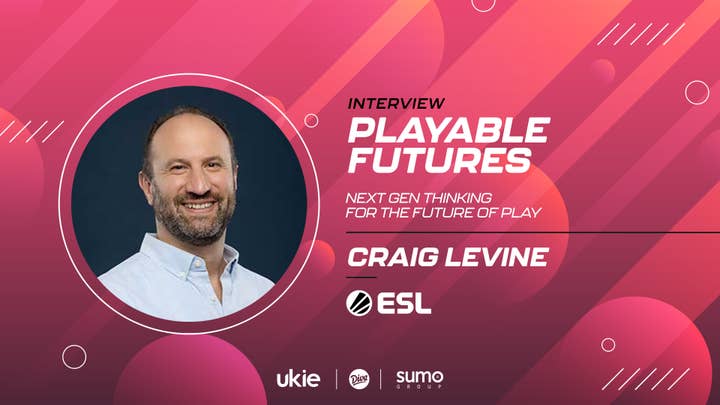'Always-on' fandoms: How esports communities are shaping the future of games | Playable Futures
ESL Gaming's Craig Levine considers a future where esports will have a profound influence across games and beyond
Playable Futures is a collection of insights, interviews and articles from global games leaders sharing their visions of where the industry will go next. This article series has been brought to you by GamesIndustry.biz, Ukie, Sumo Group and Diva.
The rise of esports in recent years has been unmissable. It's influence on the future of games as a medium, industry and cultural artefact, then, is likely to be tremendous.
Aside from all its success and growth, esports has also significantly shifted the status of the player, elevating consumers to exist as important focal points for vast communities. Esports devotees are much more than a passive audience to be sold products - they are competitors, content creators, and in some cases, adored superstars with larger fanbases than many successful games.
A new model of what fandom can offer continues to emerge within esports, and it's an opportunity many other gaming companies away from the core of esports might be wise to embrace.
The Power of Creators
Craig Levine is co-CEO at long-standing esports organisation, ESL Gaming. He has seen first-hand how esports have reshaped the industry-audience dynamic, and it's given him reason to be confident that it offers remarkable potential. Today, esports' focus on players is powerful in a myriad ways.

"We're currently in a world where players and influencers bring the power of creators, and that means a sort of this infinite distribution opportunity," he offers. "There are so many niche communities within esports - and here 'niche' doesn't mean small. I think 'niche' means focused. There are some very, very large niches in competitive gaming. The superstars of esports that come out are these incredible influencers who create tonnes of fandom around the games they focus on. They, ultimately, are keeping players of certain games engaged with the community when that community is not playing it. So I think it's incredibly powerful to build an esports ecosystem around a game."
And that gets to the very heart of the esports opportunity. For Levine, it is the digital element that really defines modern esports' strengths, and not those tempting comparisons with traditional sports. Whatsmore, it isn't only about top flight superstars.
Esports titles, in their most contemporary form, can be seen as gathering points for communities, influencers, casual players, spectators live and online, competitors at every skill level, fans of teams, and fans of individual titles.Together they make up a truly modern fandom, abundant in potential. Beyond the eagerly-viewed moments of competition, the community is engaged with the content it makes collectively streaming, posting, sharing and producing a wild range of output.
The result is an audience engaged with a given game around the clock, even when not playing or spectating. The community can even be seen as an extension of the content itself; not just a consumer. The devotion to certain games or teams does, in fact, bear comparison with traditional sports - and in combination with the connected, online fandom element, that means considerable potential to engage for months, years, or even lifetimes. For game designers, this presents a lasting opportunity to be creative while monetising from multiple revenue streams.
"The superstars of esports are these incredible influencers who create tonnes of fandom around the games they focus on"
"Competitive players are higher-value consumer customers for developers, for sure," offers Levine. "They spend more time in-game, and therefore spend more money on the game. Ultimately, esports can engage that community continually."
To Levine, that in part means monetisation through established means, such as new content, skins and subscriptions. Yet, increasingly, esports crosses over with so many other sectors. That means there's opportunity in ticket sales, licences and brand partnerships, sponsorship, video and broadcast, and multiple other digital channels and physical entities.
"What esports does is create a community of fandom outside of a game that keeps those players engaged when they're not playing," Levine continues. "And there's so many opportunities with what esports involves. I think it's incredibly symbiotic to a successful game strategy. That's why you're seeing more and more games now coming out with these new kinds of competitive features in mind."
Influence redefined
And that is the crux of the future of games, as perceived by Levine. Esports isn't just about adding an online multiplayer mode. It's about building competitive features that foster and support a contemporary, always-on esports fandom. Having watched esports' interplay with games more broadly for so many years, Levine projects a future where a great many more games increase their effort to build meaningful fandoms based on the esports model.
That's not trivial, in part because it means all those related entities - sponsorship and live ticketing and broadcast and so on - may become much more of a norm across many types of games currently considered distant from what esports is. And at the same time, esports will surely influence the sectors it embraces.
"Those spaces are $300 billion dollar industries," states Levine. "That's very different from the $1.2 billion esports has been defined as worth today. I think as we start to zoom out and see the impact our fans have on the world, and all these other entities, esports is going to continue to bleed into all those things. And it is being redefined in a way that only makes people become that much more aware of it."
Perceived another way, the increasing game industry breadth that has influenced so many other sectors is set to ramp up significantly, fuelled by the evolution of esports.
It certainly won't be the case that every game in a decade's time will be a giant of esports. Rather, Levine believes we will see an increased capacity for many different fandom-building competitive games inspired by the esports model, providing numerous different kinds of niche, large and small. All while competitive giants, established and forthcoming, will be increasingly bankable.
"When I think about the next generation of titles, they're building competitive features because, again, that develops higher-value customers for them."
"The easy thing 10 years ago - when everyone jumped into esports - was replicating the business models of traditional sports, and then thinking that's it"
Putting the E into Esports
However, Levine maintains a pragmatic perspective because, even in the established esports space, there remains a great deal still in need of refinement. In particular, he perceives that purebred esports will, in the coming years, have to put more focus on developing and maintaining business and ecosystem conventions.
"The easy thing 10 years ago - when everyone jumped into esports - was replicating the business models of traditional sports, and then thinking that's it. But a big part of that business model is media rights. I like to say the 'E' in esports actually makes it more unique than similar to traditional sports because our audience is digital. What that means is it actually doesn't work with the traditional media rights business model that has helped fund traditional sports for so long. When we look out, we can say we have a huge audience, and we do. One of the challenges today is that premium doesn't monetise in a premium way on digital. That's not an esports problem. That's not a video game problem. That's a digital problem."
There is plenty of work to be done. But there is no doubt that esport's influence on the future of games will be felt far beyond purebred competitive gaming.
For one, there is a profound opportunity in building fandoms that embrace the esports model - meaning establishing communities engaged around the clock, where the community are content creators as well as consumers, serving each other and developing tremendous and retaining loyalty.
Additionally, video games broadly are likely to see the opportunity in converging with live events, broadcast, ticketing, sponsorship and many other industries typically associated with traditional sports. There esports has pioneered the way, but the opportunity doesn't stop with large scale competitive gaming.
Simply put, esports' influence on the future of the medium is about a lot more than just competitive gaming.

